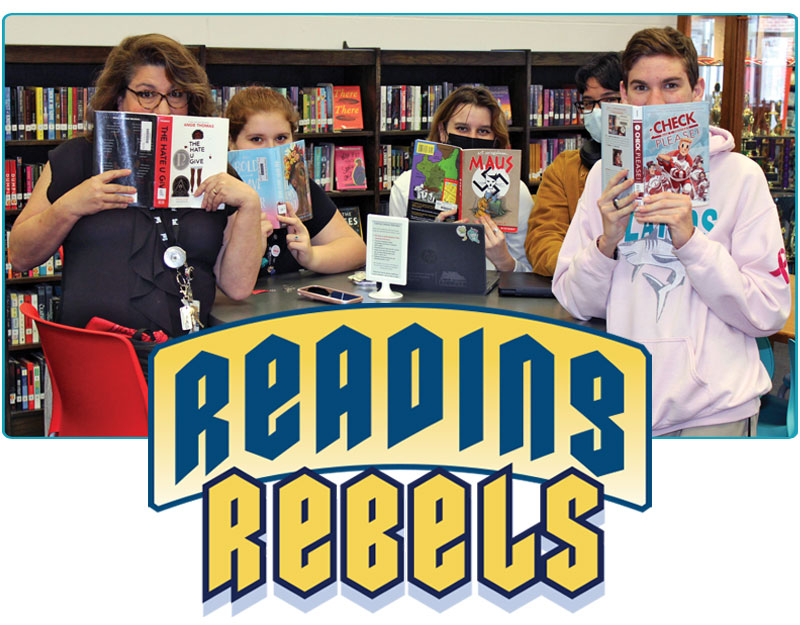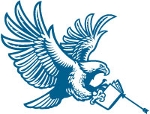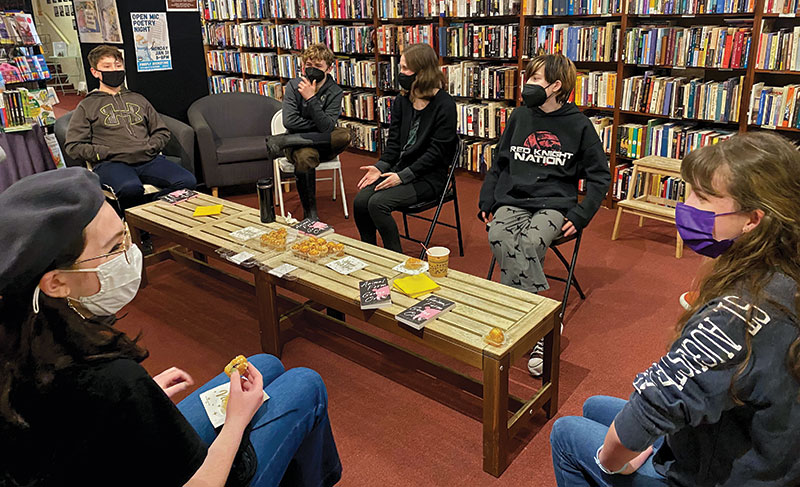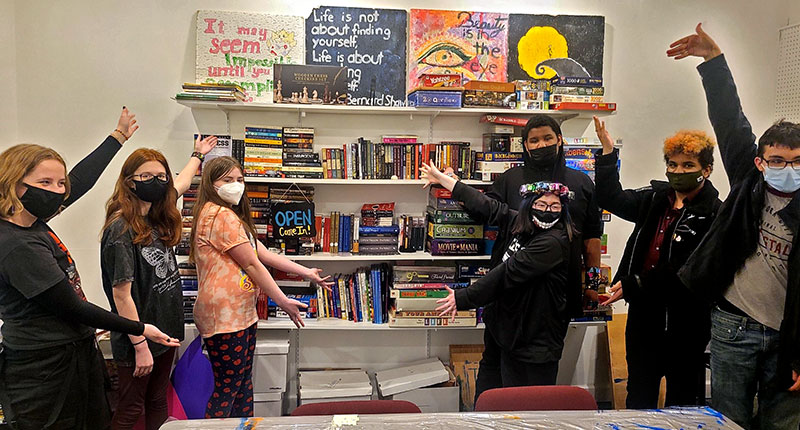Students Counter Censorship Attempts with Banned Books Clubs
As adults try to pull books from school library shelves across the country, students are responding with book clubs centered on the challenged titles.
 |
James Nave (right, in white sweatshirt) started the Islands High School banned book club in Savannah, GA.Photo courtesy of Kim Simshauser |
Related article:When History Repeats: As adults pull books from school library shelves across the country, kids create banned books clubs |
James Nave, 18, has been an avid reader since he was a kid borrowing books from his older sister—and keeping many of them to start his own collection. As he grew up, he developed a passion for science fiction and fantasy. By the time he was in high school, he was making friends through a shared interest in reading.
“Growing up, reading was the biggest part of my life,” said Nave, a senior at Islands High School in Savannah, GA.
 When Nave heard books were being challenged in school libraries across the country—a movement that eventually hit his own district—he got angry and started talking to his friends. Nave is part of a growing trend of teens responding to book challenges by creating banned book clubs.
When Nave heard books were being challenged in school libraries across the country—a movement that eventually hit his own district—he got angry and started talking to his friends. Nave is part of a growing trend of teens responding to book challenges by creating banned book clubs.
They read books that have been historically banned, as well as the ones currently being challenged, and talk about how social context influences censorship. The clubs have become a way for students to make their voices heard in a debate usually dominated by adults. They are run through schools, bookstores, and teen centers across the country, including in Georgia, Pennsylvania, and Texas.
For Nave, starting the club has opened his eyes to the importance of representation in school libraries.
He had read two books that have been frequently challenged—All Boys Aren’t Blue by George M. Johnson and Felix Ever After by Kacen Callender—and thought both were “amazing” books that needed to be on shelves, especially in his school, which has a large LGBTQ community and Black student population.
“As I looked at the different books being challenged, I’m like, ‘man, this should not be happening,’” Nave said. “A lot of them have African American main characters, LGBTQ main characters, or a combination of both. It just seemed like it was seriously targeting those communities.”
There haven’t been any official book challenges at Islands High School—or any other individual schools in the district. But nine parents and community members expressed concern over books with “pornography” and “polluted ideas” at a district-wide school board meeting in early January. The books mentioned included Callender’s Felix Ever After, Beyond Magenta by Susan Kuklin, Allegedly by Tiffany D. Jackson, Gender Queer by Maia Kobabe, and The Absolutely True Diary of a Part-Time Indian by Sherman Alexie.
Hearing about those complaints, Nave and some fellow students went to Islands High School librarian Kim Simshauser and asked if she had the books in the collection. Nave then proposed creating a book club for students to read these titles. Simshauser loved the idea, and after getting approval from her principal and district administrators to host it on campus, the book club was born.
 |
The banned book club in Kutztown, PA, has discussed contemporary novels and challenged “classics” such as Animal Farm.Photo credit: Lisa Diffenbaugh |
So far, more than 20 students have joined the club, and their first book will be Maus by Art Spiegelman, the Pulitzer Prize–winning graphic novel that recounts the author’s father’s experience as a Holocaust survivor. The book was banned earlier this year from eighth grade curriculum in McMinn County, TN, igniting debate across the country. The local school board ruled the book was inappropriate because it contained curse words and a drawing of a naked character. Though the book hasn’t been challenged in the Savannah-Chatham school district, the news struck a chord with students.
Despite some parent opposition, Simshauser said they haven’t received any pushback so far about the book club. She credits the students and their inclusive approach, as well as their maturity.
“All sides are welcome as long as the discussion is civil,” Simshauser says. “I want to know, especially from students, if they really have issues (with any of these books). They’re my constituent population, too. I need to know from them. I think people don’t give students a lot of credit. These kids are super smart, and they know how to self-censor.”
Nearly 750 miles north in the small town of Kutztown, PA, another banned book club is gearing up to read Maus. Joslyn Diffenbaugh, an eighth grader at Kutztown Area Middle School, first had the idea to start a banned book club last November when she heard about book challenges happening in Texas. She and her mother, Lisa, looked at the lists of books being challenged in the state, including the 850 titles that Texas state representative Matt Krause proposed banning. Joslyn had read many of them, and she was surprised people wanted to ban them. At a meeting in early February, the club discussed one of them, The Hate U Give, by Angie Thomas.
In her own school district, some parents raised concerns last year at board meetings about Gender Queer, All Boys Aren’t Blue, and I Am Jazz by Jazz Jennings. After reviewing the books, however, the district decided to keep them on the shelves. Reading these books now, Joslyn feels empowered to respond to the criticism she’s heard.
“With The Hate U Give, I know one of the reasons they wanted to ban it is that they said it will make you feel bad for being white if you read it,” Joslyn said. “But yet in the book club, we’ve read the book and we don’t feel bad about the color of our skin.” With I Am Jazz, she added, “They said that’ll make you transgender, and I read it and I’m not transgender.
“They’re telling us how to feel,” Joslyn said, “but we have totally different opinions on how these books are portrayed.”
After a local newspaper wrote about the club, which meets every other week at a local independent bookstore, the story blew up on social media and inspired other book clubs across the country.
Firefly Bookstore in Kutztown, which hosts the book club, said the community has given a lot of support to the teens. About 15 people are in the club, and donations have poured in to buy them books to read. In addition to The Hate U Give, they’ve also read Animal Farm by George Orwell and Fahrenheit 451 by Ray Bradbury, with Maus next on the agenda. Jordan Busits, who works at Firefly and helps facilitate the book discussions, said the teens give her hope for the future as she watches them connect the sociopolitical themes of books to current events. Not allowing young people like Joslyn to have these conversations would be a great disservice, she says.
 |
The Common Ground Teen Center’s banned book club members.Photo courtesy of Mary Jo Podgurski |
“To censor a book is to censor the history that led to its publication,” Busits says. “At best it is a misguided way to prepare teens for the real world and at worst, as recent bannings of Art Spiegelman’s and Toni Morrison’s novels in certain school districts in our country have shown, it only serves to limit the exposure of marginalized authors to these young people.”
Across the state in western Pennsylvania, Mary Jo Podgurski, who runs the Common Ground Teen Center, is overseeing a banned book club at the center. Podgurski has worked with teenagers for decades, and she finds it laughable when parents want to ban books because she knows that what they have access to on their phones is often much worse. When discussing parents being concerned about curse words in Maus, one teen actually told her, “If these words were so offensive, what do you think we see on our phones?” Her approach to the book club is to use these books to guide discussions about heavy topics with teens in a safe space that allows them to ask questions and speak freely around their peers and trusted adults.
“Young people know what’s happening,” Podgurski says. “It’s just that we don’t always say it because we think they can’t handle it, but to me the worst thing we can do is not call it out. Young people need adults, they need guidance.”
The teen center serves students from districts around Washington County, PA. So far, there haven’t been book challenges at those schools, but Podgurski says the students are reading about what’s happening at other schools with book challenges and bans. Though the teen center already has a book club, they started a new one focusing specifically on banned books including Maus, Fahrenheit 451, and Orwell’s 1984. One of the guiding questions for each discussion is, Why do you think this book has been banned before? “They tell me—and I agree—that it has to do with fear,” Podgurski says.
At Islands High School, news of the book club has informed many students about challenges in their district that they didn’t previously know about. Nave has already spoken to school officials and parents about the importance of keeping books on the shelves, and now other students want to speak at the next school board meeting, Simshauser says. Though she is overseeing the club, she says it was created by and for the students—and she is learning just as much as they are from reading the books.
“I’m a 57-year-old suburban white lady, but I feel like a better ally, a better friend to my students, a better adviser, because I’ve read these things and I’ve learned about these things,” says Simshauser. “Part of the problem when we have these book challenges [is] they take these snippets out of the books and you don’t see the big picture. Some of these books are just moving. They’re hopeful.”
Colleen Connolly is a Minneapolis-based freelance journalist who writes about children and education, among other subjects.
RELATED
The job outlook in 2030: Librarians will be in demand
The job outlook in 2030: Librarians will be in demand
ALREADY A SUBSCRIBER? LOG IN
We are currently offering this content for free. Sign up now to activate your personal profile, where you can save articles for future viewing






Add Comment :-
Be the first reader to comment.
Comment Policy:
Comment should not be empty !!!